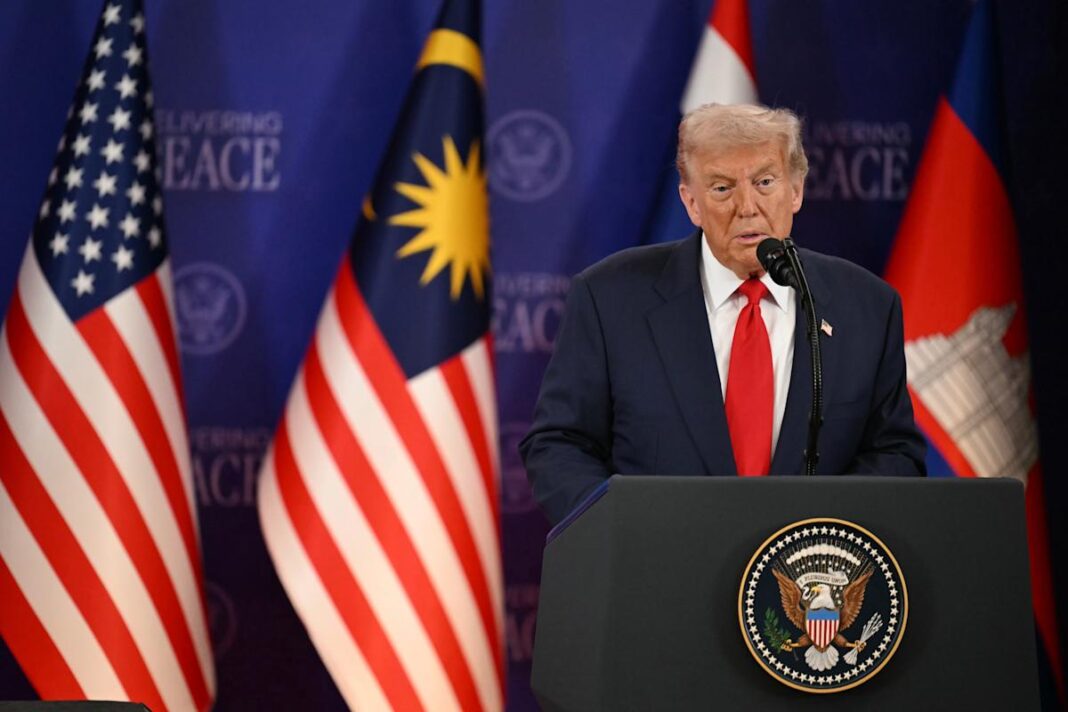Trump and Takaichi: A New Era in U.S.-Japan Relations
President Donald Trump’s recent meeting with Japan’s first female leader, Sanae Takaichi, marks a significant moment in U.S.-Japan relations. On a Tuesday during his tour of Asia, Trump praised Takaichi’s leadership and their mutual commitment to bolstering alliances and economic ties. The two leaders signed key agreements focused on trade and rare earths, components critical to technology manufacturing.
A Powerful Alliance
Trump’s appreciation for Takaichi reflects an ongoing U.S. strategy to strengthen partnerships in Asia, particularly against the backdrop of a rising China. With an emphasis on defense and economic cooperation, Trump reiterated his commitment, stating, “Anything you want, any favors you need, anything I can do to help Japan, we will be there.” This expression of support underscores the depth of the alliance, which has long been a cornerstone of American foreign policy in the Pacific.
Takaichi’s announcement regarding increased defense spending emerged as an essential part of their discussions. With regional tensions simmering, particularly due to China’s activities, this focus on military expenditures signals a proactive approach in Japan’s defense policy.
Trade Talks Amidst Global Tensions
The backdrop of Trump’s trip included a critical meeting with Chinese President Xi Jinping just days away. Trump’s discussions with Takaichi were not only about solidifying U.S.-Japan relations but also an effort to unify strategies as he approached talks with China. Observers noted an air of optimism surrounding the potential for a trade deal, following promising advance discussions. Trump’s administration hinted at possible compromises on existing tariffs, showing readiness for negotiations despite his previous hardline stance.
Additionally, Treasury Secretary Scott Bessent indicated that there are expectations of reviving trade agreements with Japan and addressing the trade deficit—an ongoing concern that has shaped U.S.-Japan discourse for years.
Navigating the China Trade Landscape
The strategic discussions with Japan are particularly relevant as they come at a vital juncture in U.S.-China relations. Tensions have escalated recently due to tariffs and trade barriers. Trump’s assurances to Takaichi may be seen as a way to create a united front against what many perceive as unfair trade practices by China. This alliance can serve as a counterbalance to China’s growing influence in the region and beyond.
In advance of his meeting with Xi, Trump expressed confidence that both sides could “come away with” a trade deal. As discussions progressed, significant advancements were reported—suggesting a willingness to find common ground, despite the complexity of issues at hand.
A Dispute with Canada
Meanwhile, back in North America, trade relations with Canada have taken a tumultuous turn. An ad produced by the Ontario government featuring Ronald Reagan criticizing Trump’s tariffs has led to a heated exchange between the two countries. Trump reacted strongly, threatening to raise tariffs by an additional 10% on Canadian goods. This episode showcases the unpredictable nature of Trump’s trade policies, which appear to balance between leveraging economic power and engaging in rhetorical battles.
Trade Policies Impacting Domestic Economies
As the Trump Administration navigates foreign relations, domestic implications of these trade policies remain critical to watch. The decision to increase tariffs on Canada reflects broader economic strategies that could have immediate repercussions for American consumers and businesses.
Moving forward, it will be essential to monitor how these international agreements and discussions will influence not just diplomatic relationships but also domestic Markets and economies.
Exploring Opportunities Beyond Asia
In addition to the focus on Japan and China, the broader ASEAN context becomes crucial as the U.S. seeks to deepen ties with Southeast Asian nations. Enhanced trade discussions with Malaysia and Cambodia were highlighted as part of Trump’s strategy to diversify U.S. trade partnerships in the region.
The approach to establishing stronger ties with these countries reflects a strategic shift to engage more positively with nations outside the direct U.S.-China rivalry. As these relationships develop, they could serve to bolster economic resilience and provide alternatives to the reliance on Chinese manufacturing.
Ongoing Developments in Global Trade
As the political landscape evolves, discussions around tariffs and trade agreements will continue, impacting multiple countries and their economies. Whether through potential trade deals or disputes, the dynamics observed in U.S.-Japan relations under Trump’s presidency will likely reverberate through global markets.
With a blend of cooperation and conflict, the future of international trade remains uncertain but undeniably significant, requiring continual assessment of policies and their implications.



